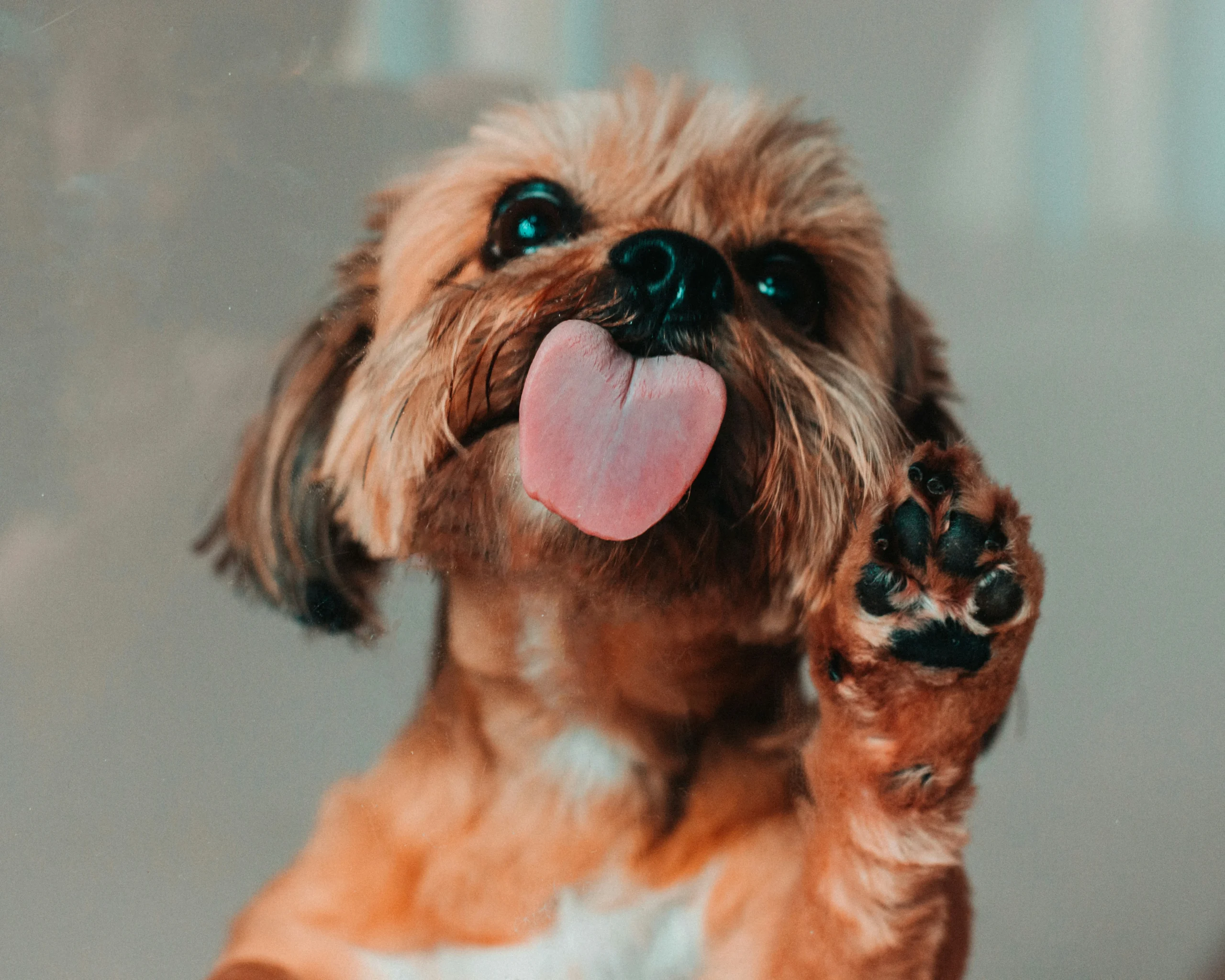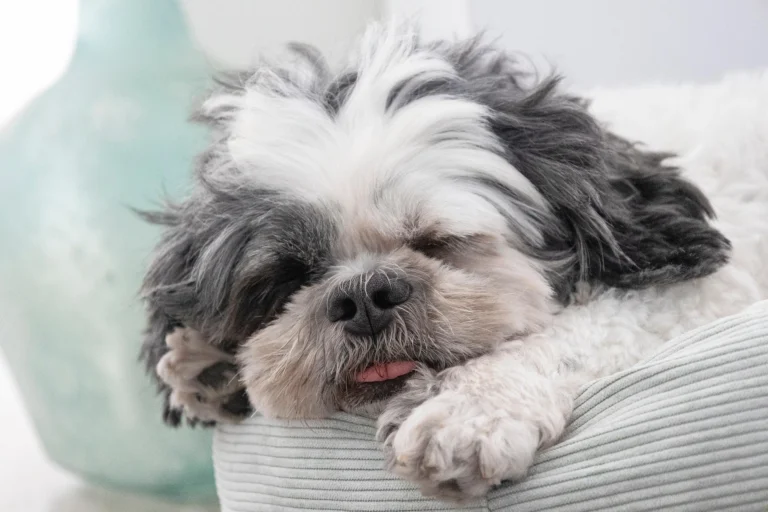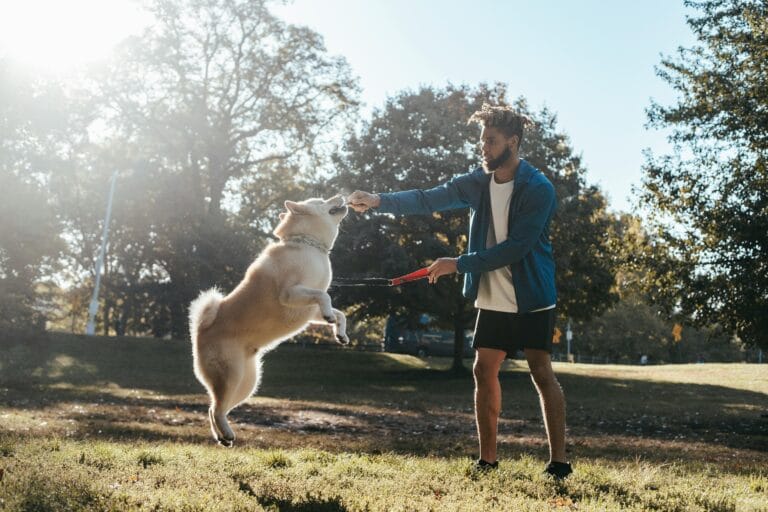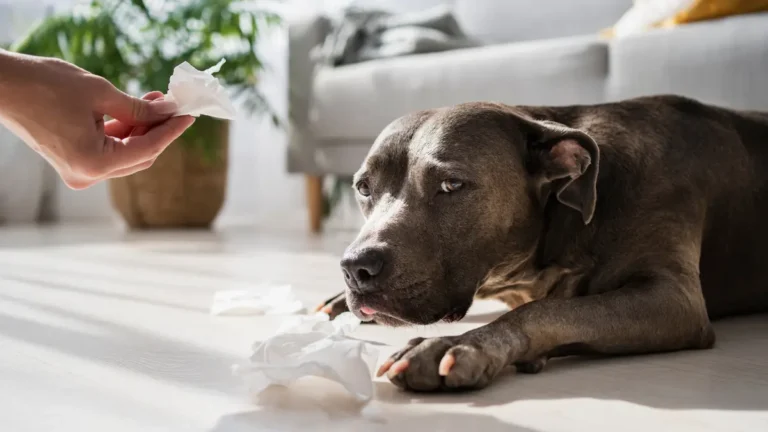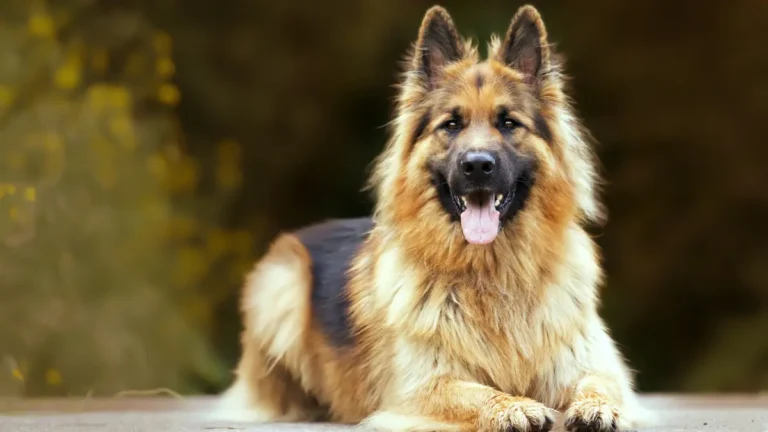Ever wondered why dogs lick their paws? It’s a common behavior, but there’s more behind it than meets the eye. While an occasional lick is nothing to worry about, constant paw licking can signal deeper issues. Whether it’s due to medical concerns, environmental factors, or simply boredom, understanding why dogs lick their paws can help you keep your furry friend healthy and happy. Let’s dive into the surprising reasons behind this behavior and what you can do to address it.
Table of Contents
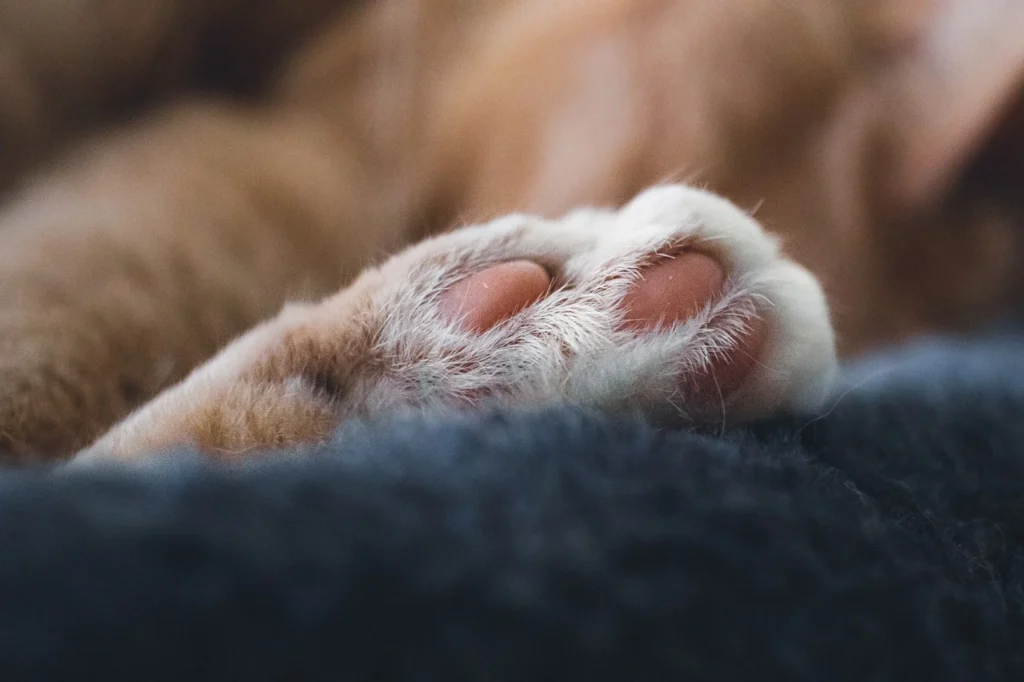
1. Normal Grooming: Why Dogs Lick Their Paws for Cleanliness
Like many animals, dogs use licking as part of their grooming routine. When dogs lick their paws, it’s often just a natural way to clean off dirt or debris after walking outside. Much like how humans might wash their hands after being outdoors, licking serves a similar purpose for dogs. This behavior tends to happen after playtime or walks, especially if they’ve been in grassy or muddy areas.
However, if you notice your dog doing this frequently, it might be more than just cleaning up after an outdoor adventure. In many cases, dogs licking their paws excessively could point to an underlying issue. It’s essential to watch for patterns and pay attention to when this behavior occurs.
2. Allergies: A Common Cause of Excessive Paw Licking
One of the most common reasons dogs lick their paws is due to allergies. Just like humans, dogs can suffer from allergies triggered by their environment or diet. Pollen, dust mites, grass, and even certain foods can cause allergic reactions in dogs. When their bodies react to these allergens, they often experience itching, and their paws are a frequent target.
You might notice that during certain seasons, like spring or fall, your dog licks their paws more than usual. This is a sign of environmental allergies, often caused by pollen. To help your dog, try wiping their paws with a damp cloth after walks to remove allergens. This simple step can make a big difference.
Tip: If you’re interested in keeping your pet comfortable, be sure to check out our guide on the “15 Must-Know Tips to Choose the Best Dog Beds for Your Furry Friend.“
3. Parasites and Infections: A Sneaky Culprit
Dogs are curious by nature, and they encounter all sorts of things outdoors—sometimes, this includes parasites. Fleas, ticks, and mites can all cause irritation on a dog’s skin and paws. As a result, dogs lick their paws to soothe the discomfort caused by these pesky invaders.
Additionally, bacterial or fungal infections are common reasons for paw licking. When dogs get small cuts or abrasions on their paws, licking may introduce bacteria, leading to infections. Signs of infection might include swelling, redness, or even a foul smell coming from the paw. In cases of severe infection, you may also notice your dog limping or avoiding putting weight on the affected paw.
If you suspect your dog is dealing with parasites or infections, it’s best to consult with your vet for proper treatment.
4. Anxiety and Stress: Emotional Reasons Why Dogs Lick Their Paws
Just like humans have nervous habits, dogs can develop behaviors to cope with stress or anxiety, and paw licking is a common one. Dogs lick their paws when they’re feeling anxious as a way to self-soothe. This could be due to separation anxiety, a change in their environment, or even a lack of mental stimulation.
Dogs that spend long periods alone or those that face sudden changes, such as moving to a new home, may begin to engage in repetitive behaviors like licking. In these cases, addressing the root cause of the stress is essential. Ensuring your dog gets plenty of exercise, mental stimulation, and affection can significantly reduce anxiety-related licking.
If your dog is showing signs of anxiety, you might also want to explore our article on “10 Shocking Facts About Can Dogs Eat Shrimp: Safe or Dangerous?” to see if dietary changes could make a difference.
5. Boredom and Lack of Stimulation: Dogs Need Mental Exercise Too
Boredom is another major reason dogs lick their paws. Dogs are intelligent animals, and they need mental and physical stimulation to stay happy and healthy. Without enough to occupy their minds, they may resort to licking as a way to fill the time.
Providing your dog with puzzle toys, regular walks, and playtime can significantly reduce boredom-induced paw licking. Dogs that don’t get enough exercise are more likely to engage in repetitive behaviors, which can eventually lead to skin irritation and even infection.
To ensure your dog stays entertained and engaged, try rotating their toys regularly and incorporating new challenges into their routine. A mentally stimulated dog is a happy dog!
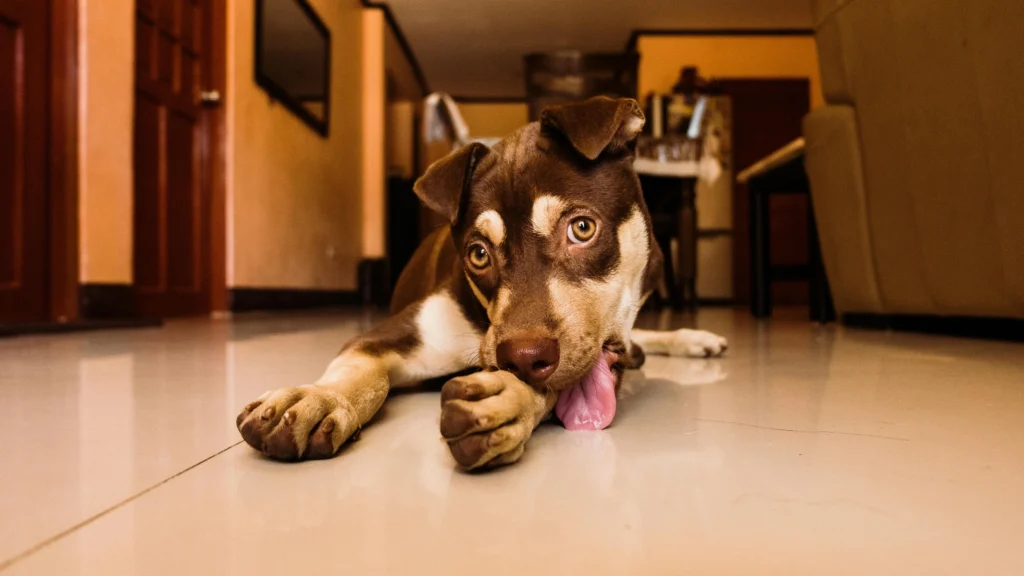
6. Obsessive-Compulsive Disorder (OCD): When Paw Licking Becomes Habitual
In some cases, paw licking may become a compulsive behavior. If dogs lick their paws constantly without any clear physical or emotional cause, they might be experiencing OCD. This condition is rare, but it can occur in dogs that have been through traumatic experiences or those that have a high level of anxiety.
Dogs with OCD often lick their paws to the point of injury, causing sores and hair loss. Treating this condition typically requires a combination of behavioral training and medication. If you suspect your dog has OCD, working with a vet or animal behaviorist is essential for finding the best treatment plan.
7. Injuries and Pain: The Silent Signals Behind Paw Licking
Sometimes, dogs lick their paws because of an injury. Whether it’s a small cut, splinter, or something more serious, licking is a way for them to try and alleviate pain. Dogs don’t always show obvious signs of pain, so paw licking could be a subtle indication that something is wrong.
Always inspect your dog’s paws after they’ve been outside. Check for cuts, thorns, or anything lodged between their paw pads. Addressing minor injuries immediately can prevent more serious issues down the line. If you notice your dog limping or favoring one paw over the other, it’s a sign that a vet visit may be necessary.
Curious about other potential health risks for your dog? You might find our article on “Can Dogs Eat Raw Chicken?” helpful.
How to Stop Excessive Paw Licking in Dogs
Now that we’ve explored the reasons why dogs lick their paws, it’s important to discuss solutions. Depending on the cause, different approaches can help stop or reduce excessive paw licking.
1. Addressing Allergies
If allergies are the culprit, it’s essential to identify what’s triggering them. This could involve switching to a hypoallergenic diet or limiting your dog’s exposure to environmental allergens like pollen. In some cases, your vet may recommend antihistamines or allergy shots to manage symptoms.
Wiping your dog’s paws with a damp cloth after walks and keeping their environment clean can also help reduce exposure to allergens.
2. Keeping Paws Clean and Healthy
Good hygiene is crucial for preventing infections and reducing paw licking. Regularly clean your dog’s paws after outdoor activities, especially if they’ve been walking on rough terrain or in areas treated with chemicals like road salt or fertilizers.
Trimming the fur around their paws can also help prevent dirt and debris from getting trapped between the paw pads, which can lead to irritation.
3. Reducing Stress and Providing Enrichment
If anxiety or boredom is causing your dog to lick their paws, increasing their physical activity and mental stimulation is key. Make sure they get enough exercise daily, and consider adding interactive toys to their routine.
For dogs prone to stress or anxiety, creating a calm environment and providing safe spaces for them to relax can significantly reduce their need to engage in repetitive behaviors like paw licking.
4. Consult a Vet for Persistent Issues
If you’ve tried addressing potential causes but your dog continues to excessively lick their paws, it’s time to consult with your vet. They can help determine whether a medical issue like an infection, parasite, or OCD is behind the behavior.
Early diagnosis and treatment are critical to preventing long-term damage, such as skin infections, scarring, or other health complications.
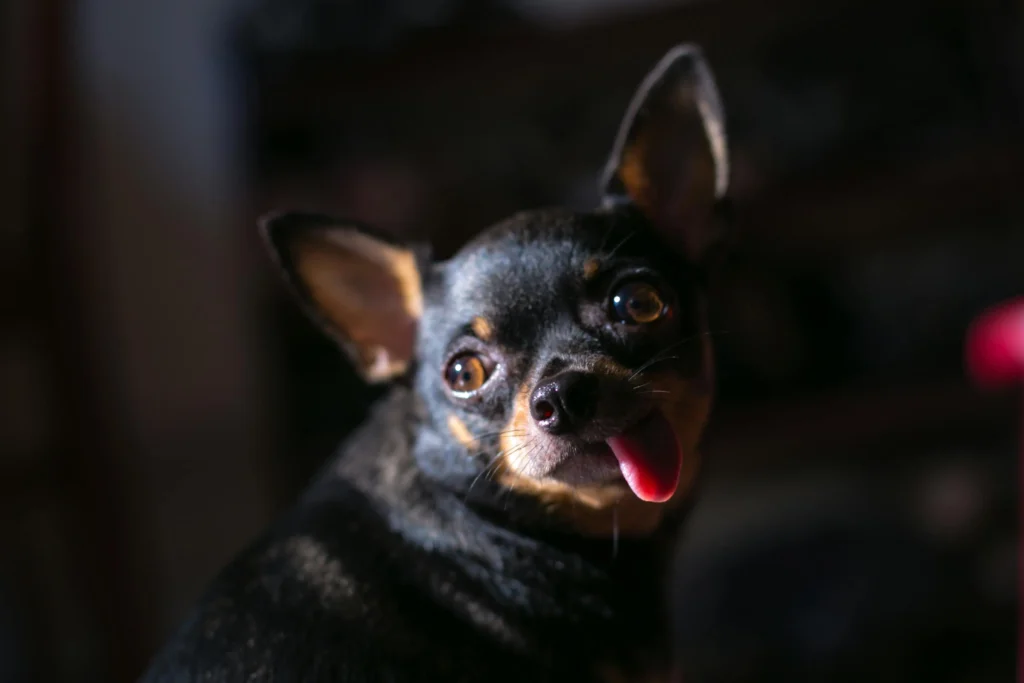
Is It Harmful If Dogs Lick Their Paws Too Much?
While occasional licking is normal, excessive paw licking can have harmful effects. Over time, repeated licking can lead to skin irritation, sores, and secondary infections. These infections, if untreated, can become serious and even affect your dog’s overall health.
Additionally, compulsive paw licking could indicate deeper emotional or psychological issues, which should be addressed to improve your dog’s quality of life.
Conclusion
When dogs lick their paws, it’s usually nothing to worry about—until it becomes excessive. Understanding the reasons behind this behavior, from allergies to anxiety, can help you pinpoint the cause and take steps to resolve it. Whether your dog is dealing with an infection, stress, or boredom, addressing the root cause can go a long way in stopping this behavior and keeping your dog healthy.
Remember, your dog relies on you to notice these subtle signs and ensure they’re living their best, itch-free life!
FAQs
Why does my dog only lick one paw?
If your dog is focusing on licking just one paw, it could be due to a localized injury or irritation, such as a small cut, thorn, or splinter. Inspect the paw carefully for any signs of injury, swelling, or foreign objects stuck between the paw pads. If nothing seems apparent but the licking continues, it’s best to consult your vet, as there could be a deeper issue such as an infection or a more serious injury that requires professional attention.
Can paw licking be a sign of pain?
Yes, dogs lick their paws to soothe pain or discomfort, especially if they have an injury, infection, or even arthritis in their joints. If you notice that your dog is consistently licking one or both paws and seems uncomfortable or is limping, this could be a sign that they are in pain. It’s important to take your dog to the vet if you suspect they are licking due to pain, as early intervention can help prevent further complications.
How can I tell if my dog’s paw licking is related to allergies?
Allergy-related paw licking is often accompanied by other symptoms such as red or swollen skin, scratching at other parts of the body, or recurrent ear infections. If your dog tends to lick their paws more during certain times of the year, like spring or fall, or after being exposed to specific environments (e.g., after walks on grass), it could be due to environmental allergies. Additionally, food allergies may also trigger paw licking. Your vet may recommend allergy testing or suggest changes in diet to help determine the cause.
Is it harmful to let my dog lick their paws all the time?
While occasional licking is part of normal grooming, excessive paw licking can lead to skin irritation, sores, and infections. Constant licking weakens the protective barrier of the skin, making it more susceptible to bacteria and fungi. Over time, this can cause painful infections that require medical treatment. It’s best to address the root cause of frequent licking to avoid long-term health issues.
When should I take my dog to the vet for paw licking?
You should take your dog to the vet if the paw licking becomes frequent or obsessive, especially if it’s accompanied by visible symptoms like redness, swelling, bleeding, or a bad odor coming from the paws. Additionally, if your dog starts limping or shows signs of pain, it’s crucial to seek veterinary care immediately. Chronic paw licking that doesn’t improve with home remedies or environmental changes could indicate a more serious medical or behavioral issue that requires professional attention.

